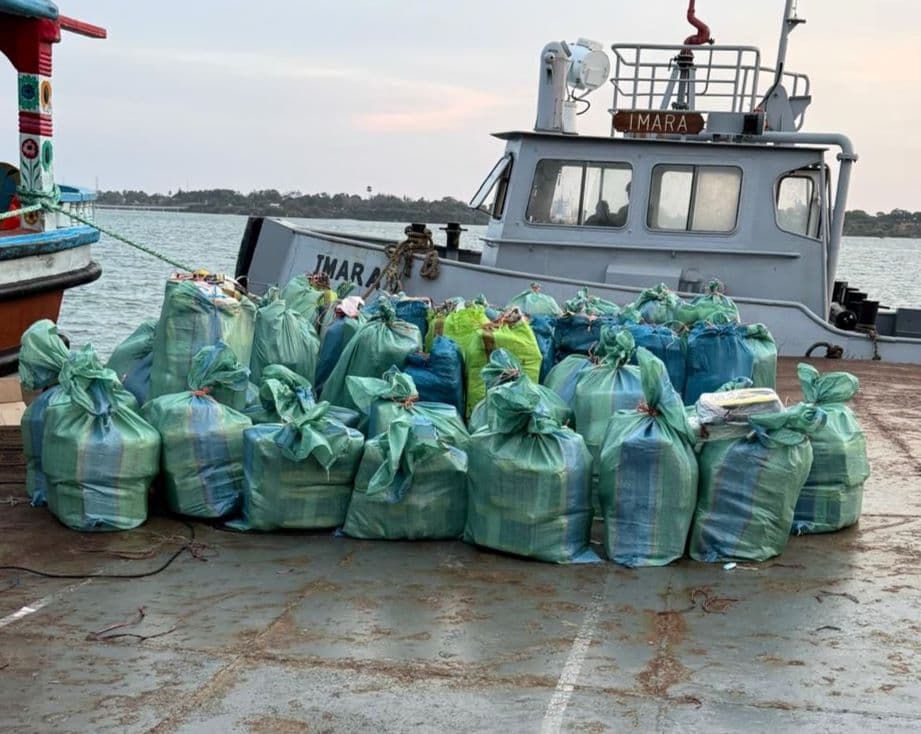We're loading the full news article for you. This includes the article content, images, author information, and related articles.
Following the collapse of a similar landmark case, the Director of Public Prosecutions faces immense pressure to secure a conviction in a massive narcotics seizure, a case that will test Kenya's ability to dismantle international drug networks.

The Office of the Director of Public Prosecutions (ODPP) is facing a defining test of its credibility and competence following the seizure of 1,024 kilograms of methamphetamine valued at Sh8.2 billion off the Kenyan coast. The prosecution of six Iranian nationals arrested in connection with the haul places DPP Renson Ingonga's office under intense public and judicial scrutiny, particularly in the shadow of a strikingly similar case that collapsed in court just months ago.
In a multi-agency operation named "Bahari Safi," conducted on Friday, October 24, 2025, the Kenya Navy intercepted a stateless dhow, reportedly nicknamed 'Igol' or 'Mashallah', approximately 630 kilometres east of Mombasa. The operation, which involved intelligence from regional and international partners, led to the arrest of the six crew members and the discovery of the narcotics hidden in sacks disguised as bags of coffee. On Monday, October 27, 2025, the suspects—identified as Jasem Darzadeh Nia, Nadeem Jadgal, Imran Baloch, Hassan Baloch, Rahim Baksh, and Imtiyaz Daryayi—were arraigned at the Shanzu Law Courts in Mombasa. The prosecution immediately sought to detain them for 30 days to complete investigations, citing language barriers and the complexity of the transnational case.
This high-stakes case unfolds against the backdrop of the spectacular failure of a previous major drug prosecution. In May 2025, the High Court acquitted seven foreigners who had been sentenced to life imprisonment for trafficking 370.8 kilograms of heroin worth Sh1.3 billion. That case involved the vessel MV Amin Darya (also known as Al Noor), intercepted in 2014.
In her appellate judgment, Justice Wendy Micheni delivered a scathing critique of the prosecution's handling of the 2014 case, citing a series of catastrophic procedural blunders. These included failures to secure search warrants, evidence of confessions obtained under duress, a broken chain of custody for the drug exhibits, and the inability of the ODPP to even prove the vessel was seized within Kenyan territorial waters. Justice Micheni noted the case was "doomed from the start" and its conduct brought the "entire criminal justice system into disrepute." This history looms large, with legal analysts warning that the ODPP must study that judgment meticulously to avoid repeating the same "careless incompetence."
The massive seizure underscores Kenya's strategic and vulnerable position on the "Southern Route," a major maritime corridor for trafficking narcotics from production hubs like Afghanistan to consumer markets in Africa and Europe. Reports from the United Nations Office on Drugs and Crime (UNODC) have long identified East Africa as a critical transit point, citing factors like porous maritime borders, corruption, and limited law enforcement capacity. The Sh8.2 billion meth haul is the second-largest narcotics seizure in Kenyan history, surpassed only by the 1.1 tonnes of cocaine found in Nairobi and Malindi in 2006. This pattern highlights the persistent threat of transnational organized crime to Kenya's national security and the well-being of its citizens, particularly the youth along the coast who are grappling with rising addiction rates.
For the DPP, the challenge is twofold: successfully prosecuting the six suspects and restoring public faith in the ODPP's ability to handle complex, high-profile criminal cases. The office has recently faced widespread criticism for withdrawing a series of prominent corruption cases, leading to public and parliamentary accusations that it is becoming the weakest link in the justice chain. DPP Ingonga has defended these withdrawals, arguing they are based on the strength of the evidence provided by investigative bodies and are intended to save taxpayer money from malicious prosecution lawsuits.
However, in this case, the pressure to proceed is immense. The successful interception was the result of significant international cooperation, reportedly involving the Seychelles Coast Guard and intelligence from other partners. Such collaboration is essential, as Kenya often lacks the capacity to effect arrests in international waters independently. Legal frameworks like the UN Convention on the Law of the Sea (UNCLOS) provide the authority for Kenya to prosecute crews of stateless vessels engaged in trafficking on the high seas.
To secure a conviction, the ODPP must now demonstrate a mastery of legal and procedural detail that was absent in 2014. This includes ensuring fair trial standards are met, such as providing competent Farsi translators for the accused, maintaining an unimpeachable chain of evidence from seizure to courtroom, and presenting a clear, evidence-backed case that proves jurisdiction and intent. Interior Cabinet Secretary Kipchumba Murkomen has already announced the government's intention to publicly destroy the drugs after the court process, a move intended to signal a tough stance. However, a symbolic gesture cannot substitute for a successful prosecution. The outcome of this trial will be a critical verdict not only on the guilt or innocence of the six accused men but on the credibility and capability of the Director of Public Prosecutions himself.
Keep the conversation in one place—threads here stay linked to the story and in the forums.
Sign in to start a discussion
Start a conversation about this story and keep it linked here.
Other hot threads
E-sports and Gaming Community in Kenya
Active 9 months ago
The Role of Technology in Modern Agriculture (AgriTech)
Active 9 months ago
Popular Recreational Activities Across Counties
Active 9 months ago
Investing in Youth Sports Development Programs
Active 9 months ago
Key figures and persons of interest featured in this article